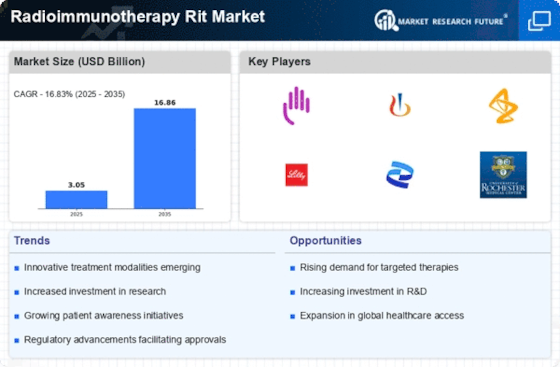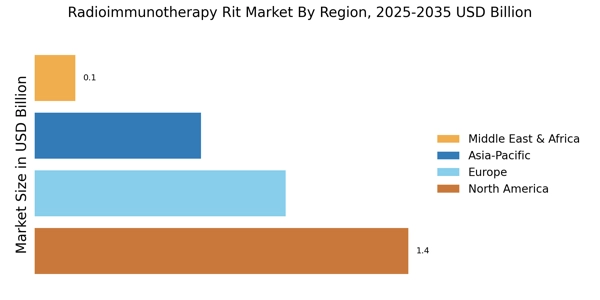Increasing Incidence of Cancer
The rising incidence of cancer worldwide is a primary driver for the Radioimmunotherapy Rit Market. As cancer cases continue to escalate, the demand for effective treatment options intensifies. According to recent statistics, cancer is projected to affect millions annually, leading to a significant increase in the patient population requiring innovative therapies. Radioimmunotherapy, which combines radiation therapy with immunotherapy, offers a targeted approach that may enhance treatment efficacy while minimizing side effects. This growing patient base is likely to propel investments in research and development, thereby expanding the Radioimmunotherapy Rit Market. Furthermore, the increasing awareness of cancer screening and early detection may contribute to higher diagnosis rates, further driving the need for advanced therapeutic solutions.
Growing Investment in Cancer Research
The growing investment in cancer research is a crucial driver for the Radioimmunotherapy Rit Market. Governments, private organizations, and pharmaceutical companies are increasingly allocating funds to explore innovative cancer therapies, including radioimmunotherapy. This surge in funding is likely to accelerate the development of new radioimmunotherapeutic agents and enhance existing treatment modalities. For instance, recent reports indicate that global spending on cancer research has reached unprecedented levels, with billions of dollars directed towards clinical trials and drug development. Such financial backing not only fosters innovation but also facilitates collaborations between academic institutions and industry players, further propelling advancements in the Radioimmunotherapy Rit Market. As a result, patients may gain access to cutting-edge therapies that improve survival rates and quality of life.
Rising Demand for Personalized Medicine
The rising demand for personalized medicine is significantly influencing the Radioimmunotherapy Rit Market. Patients and healthcare providers are increasingly seeking tailored treatment approaches that consider individual genetic profiles and tumor characteristics. Radioimmunotherapy, with its ability to target specific cancer cells, aligns well with the principles of personalized medicine. This trend is supported by advancements in biomarker research, which may enable clinicians to identify patients who are most likely to benefit from radioimmunotherapy. As the healthcare landscape shifts towards more individualized treatment strategies, the Radioimmunotherapy Rit Market is expected to experience growth. Furthermore, the integration of genomic data into treatment planning may enhance the effectiveness of radioimmunotherapy, leading to improved patient outcomes and satisfaction.
Technological Advancements in Radiotherapy
Technological advancements in radiotherapy are significantly influencing the Radioimmunotherapy Rit Market. Innovations such as improved imaging techniques, enhanced delivery systems, and novel radiopharmaceuticals are transforming treatment paradigms. These advancements enable more precise targeting of cancer cells, potentially increasing the effectiveness of radioimmunotherapy. For instance, the development of next-generation radiolabeled antibodies has shown promise in clinical trials, suggesting improved outcomes for patients. The integration of artificial intelligence and machine learning in treatment planning may also optimize therapeutic strategies, leading to better patient management. As these technologies continue to evolve, they are expected to attract investment and drive growth within the Radioimmunotherapy Rit Market, ultimately benefiting patients with more effective treatment options.
Regulatory Support for Innovative Therapies
Regulatory support for innovative therapies is playing a pivotal role in shaping the Radioimmunotherapy Rit Market. Regulatory agencies are increasingly recognizing the potential of radioimmunotherapy as a viable treatment option for various cancers. Streamlined approval processes and incentives for orphan drugs are encouraging pharmaceutical companies to invest in the development of radioimmunotherapeutic agents. This supportive regulatory environment may lead to faster market entry for new therapies, thereby expanding treatment options for patients. Additionally, the establishment of clear guidelines for clinical trials and post-marketing surveillance enhances the credibility of radioimmunotherapy, fostering confidence among healthcare providers and patients alike. As regulatory frameworks continue to evolve, they are likely to facilitate growth within the Radioimmunotherapy Rit Market, ultimately benefiting those affected by cancer.

















